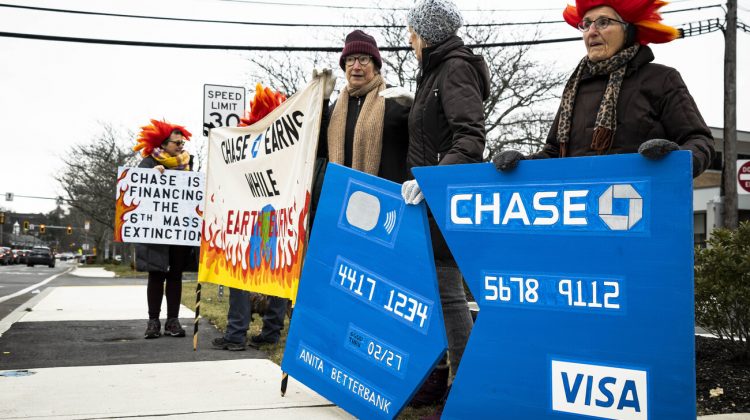SWAMPSCOTT — A group of climate activists gathered outside Chase Bank at 970 Paradise Road Saturday morning to protest JP Morgan Chase & Co’s investment in the fossil fuel industry for the seventh consecutive month since July.
At 11:30 a.m., Judith Black, a representative from the climate activism group 350 Mass, stood with a group of roughly six other protestors sporting a flame-shaped hat and holding two halves of a large wooden board resembling a Chase Bank card that had been sliced open.
Although, since July, Black and her fellow protesters have spent the first Saturday of every month protesting outside the Swampscott Chase, Black said the group has been involved in climate activism for much longer.
Before they assumed their post in Swampscott, Black said the protesters rallied outside a separate Chase bank in Peabody and took part in a large climate protest in Boston last spring, in which she cut open the bank card display with a large electric saw and encouraged members of the crowd to cut up their own bank cards.
“Chase Bank is the biggest funder of fossil fuels in the world,” Black said. “We are here to demand that Chase Bank takes immediate action to divest from fossil fuels and invest in sustainable, clean energy alternatives.”
Climate activist Sandra Winter, of Marblehead, said she chooses to stand outside the bank each month because she wants to protect the environment for her seven grandchildren. Another activist, Jim Mulloy of Salem, walked away from his lifelong role as a Leukemia researcher to join the climate action movement full-time in 2016.
“I gave up my career, gave up my tenure, gave up my professorship… we’ve got to get this under control. People need to step up.” Mulloy said. “There’s a big movement to stop that money pipeline into destroying our world. If they can get money to build it, they can’t build it.”
Chase Bank employees declined to comment on the protests. Black said the group, which will continue its monthly demonstrations, holds no animosity toward the Swampscott Chase or any of its employees or managers.
“We’re not going after them,” Black said. “They aren’t the ones who call the shots.”

